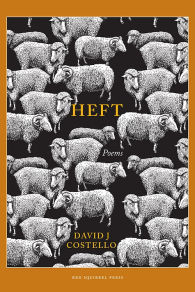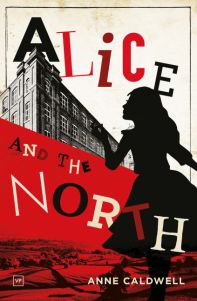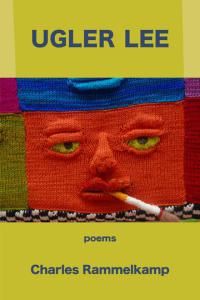
David J. Costello, Heft, Red Squirrel Press, 2020. ISBN 978-1-913632-00-7. 76pp. £10.00.
Red Squirrel Press has established a reputation for beautifully produced books and this collection is no exception. The typeface alone, Adobe Caslon Pro, is a joy. This is also true of the typesetting and design, which is not surprising given that the typographical maestro, Gerry Cambridge, who is also a fine poet, was responsible.
Fittingly for a press of this order, Costello may confidently be categorised as an exponent of the well-crafted poem, and his many successes in competitions attest to this. He is undoubtedly a skilful poet. The term well crafted, however, is sometimes perceived as bordering on the dismissive. It is perhaps as reductive as classifying a painter as a “colourist”, which notably Colm Toibin has deplored, likening it to regarding a novelist as a mere story teller. Nevertheless I do think that craft itself deserves recognition in itself and the care Costello takes with his poems makes them shine out against so much published work that is pedestrian, lame and slapdash.
However, there is a corresponding negative aspect to craft and that is the sometimes transparent determination to strive for apparent excellence. Perhaps here he reveals his pedigree as a serial competition winner where the intention to impress is paramount. The title poem of the collection, for instance, is finely delineated, but the metaphors that illustrate “the instinct of some breeds of sheep to stay in a small, local area” (which is what a heft is) seem to be a little over-determined. A line in the first stanza “Every lamb is impregnated with its map” is echoed in the final line of the poem with “the milky-white cartography of snow”. The play on words adds colour to the poem, even a Metaphysical conceit, but there is also the sense of “see what I did there”. To be fair to Costello, this is a difficult trick to get right and most of the time he does pull it off.
While Costello’s style is predominantly spare and restrained, there are occasional effects that are more florid, as in Egret:
The cryptic water pixilates its shape,
wears its speckle like an oily slick,
its one albino pigment haemorrhaging
rainbows as it turns chameleon
Some people might be prompted to take their hat off for such virtuosity but here it seems to me it works against itself although one might argue the confusion is mimetic of what is being represented. On the other hand, I do applaud the effort in attempting to push the boundaries of poetic expression and go beyond the bland and the beige. However, contrast the opening of the same poem, which because it has more control is more effective:
Amongst the raucous ordinary,
a calm extravagance is stealing
stillness from the chaos
Those lines possess the hallmarks of greatness. Indeed, where Costello most excels is in poetry that attains to art as opposed to craft. In this respect, the poem becomes, as Wallace Stevens put it, “the cry of its occasion”.
Another impressive example of this is Hansel and Gretel. From the opening stanza one is immediately held in a spell that goes beyond mere technique:
The vast emptiness
of the unrecorded forest
slowly fills their eyes.
Lost feet unpick
densely threaded paths
re-weaving the strands
into familiar bewilderment.
This is literary magic, a potent mixture of imagery and tonal quality that deserves to be acknowledged and celebrated. The poem is note perfect throughout. It was justly nominated for the 2014 Pushcart Prize.
On the whole the poems in Heft demonstrate an approach that might well be informed by Williams Carlos Williams’ definition of poetry as machines made of words. Costello’s poems have explicit subjects that are brought vividly to life through the mechanism of language at its most refined and exquisite. At its best what is achieved are moments of epiphany. We witness this in the final stanza of ‘The Smiling Saint’:
But once a day the sun cleaves through the glass
and liberates an iridescent shard
to find his face and trace across the fullness
of his lips the axis of a smile.
How refreshing too that Costello reclaims the often derided “shard” from the dustbin of poetic words and makes it shine, offering a neat half rhyme with “glass”. Other assonance too works subtly to create effects that work like a well-tempered instrument: “find” “smile” and “face” “trace”. It is on the basis of such work that Costello deserves his reputation as a fine lyrical poet.
David Mark Williams
To order this book click here
David Mark Williams writes poetry and short fiction. He has two collections of poetry published: The Odd Sock Exchange (Cinnamon, 2015) and Papaya Fantasia (Hedgehog, 2018). For more information go to www.davidmarkwilliams.co.uk
Anne Caldwell Alice and the North,
Valley Press, 2020. ISBN 978-1-1912436-52-1. 65 pp. £9.99.
Readers of Caldwell’s previous collections (both with Cinnamon Press) have already met Alice – as a fleeting observer warning a sea creature in ‘Talking with the Dead’, and a northern familiar in ‘Waymarker’, which sets the backdrop for this latest exploration of love, loss, belonging and searching. In Alice and the North the eponymous Alice is at times the poet herself in her youth (remembering her prematurely departed father and squabbles with sisters), at time the actualised evolution of a poetic voice, at times a sister to the heroine of Lewis Carroll’s works, and (always) the tough, tender lineaments of the physical landscapes of northern Britain. Caldwell’s ‘north’ is also located above the Arctic Circle, as her protagonist travels to ‘the Pole’s magnetic embrace’, where ‘there had been a beautiful Swedish man on the mail ship and the possibility of sex.’
Caldwell’s gravitation towards prose poetry is already marked by her work as co-editor of the Valley Press Anthology of Prose Poetry (2019, with Oz Hardwick) and here she slides into the form with all the comfort of a made-to-measure dress. She uses all the lyricism associated with lineated verse, practising ‘in her head an arpeggio of windblown nests and broken eggs’; luxuriates in the strictures of rhythm: ‘Her wildness of language is gritstone and millstone; volcanic in nature or limestone dissolving in caverns and sinkholes.’ But she also finds in the prose poem form opportunities for clear messages, untarnished by intrusive first person narration: ‘Jerusalem Farm is up for sale and the New Delight is short of drinkers. This is the land of miracles but this year they are as thin on the ground as lapwing’s eggs.’ Caldwell’s frame of reference is by no means limited to the post-industrial compass north, though she is rooted there: ‘Alice is a giantess lying across Yorkshire, her legs bent in sleep, slightly parted, curving along the river. Mist settles in the creases of her skin, once full of the singing of shuttles.’ She’s also concerned with memories of the Cold War; the actualities of global warming and the floods it brings to her current home town of Hebden Bridge; the trauma of Brexit; Trump’s America; the forever secretly-buried victims of Myra Hindley beneath Saddleworth Moor, ablaze in a recent arson attack.
Her eye for detail is shown in innumerable evocations of wildflowers, the shifting seasons and machinations of moorland weather, birds and the minutiae of domestic life: ‘Aunt Bertha is a walnut, dressed in jet and lace … [she] removes a key on a chain from deep within her bodice. She swings open a cabinet crammed with porcelain and cranberry glass.’ The collection is also peopled with hapless lovers, who sleep while ‘Alice’ watches and writes (masquerading as a trespassing cat), men who leave her with only the smell of a Harley Davidson, and the lure of ‘his motorway skin.’ Alone, she seems to have plenty to think about: ‘She tells her sister there’s no room big enough in her worker’s cottage to hold a man.’ Her readers, however, are fortunate enough to be welcomed into an intensely observed, passionate, at times wistful world from which we emerge like Lewis Carroll’s Alice from her rabbit hole, blinking slightly in the sunlight, re-engaging with the so-called ‘real’ world after an absorbing visit to the worlds of the imagination. This carefully observed collection repays multiple readings. Treat yourself and your favourite friends to a copy.
Hannah Stone
To order this book click here
Hannah Stone is the author of Lodestone (Stairwell Books, 2016), Missing Miles (Indigo Dream Publishing, 2017), Swn y Morloi (Maytree Press, 2019) and several collaborations, including Fit to Bust with Pamela Scobie (Runcible Spoon, 2020). She convenes the poets/composers forum for Leeds Lieder, curates Nowt but Verse for Leeds Library, is poet-theologian in Virtual Residence for Leeds Church Institute and editor of the literary journal Dream Catcher. Contact her on hannahstone14@hotmail.com for readings, workshops or book purchases.
Charles Rammelkamp, Ugler Lee,
Kelsay Books, 2020. 118pp. $18.00
The title poem of Charles Rammelkamp’s latest collection explains what Ugler Lee, a bit of Rammelkamp family folklore, means. It’s the term his father used whenever “something unspeakable happened.” In the case of this poem, it’s the night Rammelkamp’s paternal grandmother died, which, alas, happens to be Christmas Eve of 1970. the family gathered for the traditional feast, which now tastes like ashes to them, when they can force anything past their mouths.
That poem sets the scene and mood for the rest of the collection, which is suffused with, pursued by, mortality, a catalogue, if you like, of all the deaths that Rammelkamp has been besieged by: first, his grandmother, then his father, then his mother, finally his two brothers, one of whom is his twin. Not to mention uncles and aunts who fall along the way, and his mother- and father-in-law, and even Steve, Rammelkamp’s ancient cat.
Which is not to say it’s an utterly lugubrious collection that will make you go out and slit your wrists upon reading the final poem. Actually there are some very funny, almost laugh out loud, moments, as in one of the last poems in the collection, “Meeting My Mother in the Hereafter,” where Rammelkamp imagines his mother berating him for not attending to her on the final day of her life. Instead, he was forced to leave for home after a family vacation with his wife and younger daughter, to make sure the latter makes it on time for the MCAT exam back in Baltimore. When Rammelkamp mumbles, “I came back to your funeral,” his mother replies, “But I was already dead then.” Then, after letting the poet stew with accusations of “You were always the big atheist,/ didn’t believe in God or Heaven,/ Mr. Existentialist. Mr. Nihilist,” in the manner of all mothers and their unconditional love for sons who are born to disappoint them, she finally says, “Come here, give me a kiss.” The line is so perfect I didn’t know whether to laugh or cry, or both, for the warm way it made me feel.
But even more than a collection about death, it’s a collection about life, the lives (and love lives) of Rammelkamp’s grandparents, parents, brothers, his wife, and children. In the opening poem, “The Arrival of Spring,” Rammelkamp’s grandmother tells him how she met and fell in love with her husband, the poet’s grandfather, in a bank in a small Tennessee town. Indeed, nothing in the event or in her retelling of it could be more prosaic, but to Rammelkamp, her seeming nonchalance in describing the meeting is a sort of code “for an elaborate mating ritual,” and though “She spoke with the fond indifference/ of recollection…” Rammelkamp can imagine
…I could hear
the cries of cats in heat
in distant midnight backyards,
smell the spray of musk animals emit
to tease the sexual sense.
Continuing with this dual theme of chronicling the lives and deaths of his family, Rammelkamp, in “Homeless and Hungry,” tells us about his grandmother’s practice of making sandwiches for hobos during the Great Depression. Like a lot of other good deeds, this one does not go unpunished. Soon, many more homeless men than she can possibly accommodate are asking her for work, which both they and she know is merely code for “…could you give a fella some food?”
But as kind as she could be to hard-up strangers, Rammelkamp’s grandmother was a nasty piece of work to her own daughter, as in “The Bond: “Even after…we left town as if fleeing a dictator,/ I felt her tugging at my sleeve.” It seems only in the older woman’s death can Rammelkamp’s mother feel free. But, alas, not even then, it seems, for the poem ends, “Now in her nineties, her mother/ dead nearly half a century/ my mother wait[ed] for an apology/ she knew would never come.”
But the bulk of this collection is about the lives of Rammelkamp’s parents. His love for them shines through each poem that touches on their lives and deaths, but like all parents and children, their relationships are not simple, indeed are often complicated, and sometimes downright fraught, as in “Sarcasm.” Here, a joke, a piece of sarcasm that the teenage Rammelkamp had intended for his father’s amusement goes horribly wrong: “‘You ungrateful little shit,’/ my father snarled…” when Rammelkamp mock-complains that his father had kept him waiting a half hour after school, rather than give him a car of his own.
But no collection that features one’s beloved parents so prominently would be complete without the almost obligatory scene of their offspring, whether a child or teenager, accidentally witnessing them having sex. “The Wife’s Goodbye” is told from Rammelkamp’s mother’s point of view, upon the death of her husband. She wants to see him one last time, but doesn’t necessarily want her son there with her, and would rather spare him the hard sight of seeing his father dead. But that decision triggers another, much earlier memory:
I remembered the morning
he walked into our bedroom,
a boy of fourteen,
and saw my husband…
I think I’ll draw the veil of discretion over what he actually did witness. But once again, this poem proves the collection’s unstated theme that’s the reverse of the graveside prayer, “In the midst of life, we are in death.” Here, it’s “In the midst of death, we are in life,” in all its unruly and embarrassing fecundity and flowering. We snatch from the Reaper the joys we can, even if they embarrass the hell out of us.
So, far from being a catalogue of lugubriousness, a dirge without music, this is a collection that relishes lives well lived, even while acknowledging the inevitable end of every life. I once told my wife that I hated reading biographies, because they always ended the same. She shot back, that she loved biographies, because it’s not that we die, since we all die, but how we lived. Rammelkamp describes how well his parents, brothers, family and in-laws lived, and how well they were loved (and sometimes, inevitably, positively loathed), not just by family, but by people whose lives they touched along the way. No, they weren’t saints, they were something far better: living, breathing, real people, getting through their lives as best they could. Read Ugler Lee and take the journey with them.
Robert Cooperman
To order this book click here



